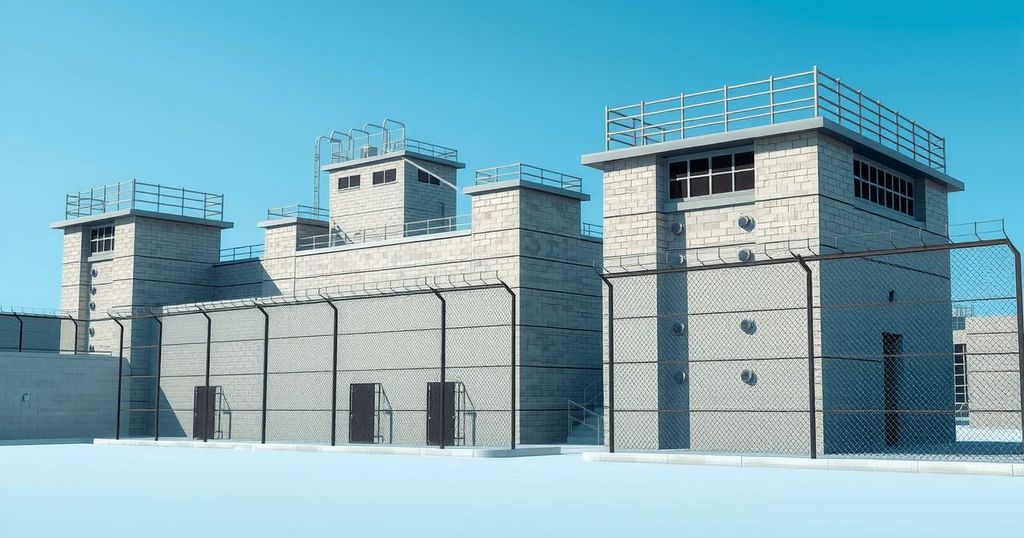World news
AP, ARAGUA, ASIA, COLOMBIA, CUBA, DHS, EL, EL SALVADOR, FEDERAL COURT, GUN VIOLENCE, HOMELAND SECURITY, KRISTI NOEM, MEXICO, NAY, NAYIB BUKELE, NO, NOEM, NORTH AMERICA, PATROL, PHILIPPINES, POLITICS, SOCIAL ISSUES, SOCIAL MEDIA, SOUTH AMERICA, TE, TREN DE, U. S, UNITED STATES, VIOLENCE
Elena Martinez
0 Comments
DHS Secretary Noem’s Visit to El Salvador Prison: Implications for Deportees
Secretary Kristi Noem visited a high-security prison in El Salvador, where deported Venezuelans accused of gang membership are held following actions by the Trump administration. Her visit aims to discuss increasing deportation efforts while human rights advocates criticize the treatment of these individuals. The deportees face uncertain futures, as they are imprisoned without formal charges and lack consular support.
U.S. Homeland Security Secretary Kristi Noem visited a high-security prison in El Salvador on Wednesday, where Venezuelans accused of gang affiliations are detained following deportations from the United States. This visit to the infamous facility coincides with the Trump administration’s assertion that they are targeting the most dangerous offenders. Noem’s tour included crowded cell blocks and an isolation unit, serving as a stark visual representation of the conditions therein.
The Trump administration is currently defending its actions in federal court regarding the deportation of these Venezuelans, while human rights advocates argue that the prisoners face serious human rights violations. During her visit, Secretary Noem observed inmates held for suspected gang associations. According to reports, the men seemed subdued and made no noise while in their cramped quarters.
Following the tour, a post on X indicated that Noem’s discussions with El Salvador’s President Nayib Bukele would focus on enhancing deportation efforts from the U.S. Noem is known for her prominent role in immigration enforcement initiatives and is currently on a three-day trip that will also take her to Colombia and Mexico.
This month, under the Alien Enemies Act of 1798, the Trump administration removed these Venezuelans, portraying them as members of the Tren de Aragua gang. This Act bestows extreme powers that bypass standard judicial processes for noncitizens. However, an appeals court recently upheld a ruling that restricts additional deportations to El Salvador based on this legislation.
A significant concern remains regarding the detainees’ future, as they are not currently serving formal sentences yet are imprisoned indefinitely in what is known as the Terrorism Confinement Center. Many relatives of the deported individuals ardently deny any gang connections and have sought legal representation to advocate for their release. Many of the deported individuals reportedly lack criminal backgrounds, a fact acknowledged by U.S. officials.
The Justice Ministry of El Salvador outlined grim realities within the prison, which opened in 2023. It is designed to encase up to 40,000 inmates without access to educational programs or visitations. Furthermore, diplomatic relations between El Salvador and Venezuela have deteriorated since 2019, leaving the deportees without consular support.
Footage has surfaced showing deportees being treated harshly upon arrival at the airport, with security forces managing their movement. The ongoing state of emergency in El Salvador has resulted in mass arrests, often lacking proper legal recourse, under President Bukele’s campaign against gang-related crime.
In a demonstration of the conditions, Justice Minister Gustavo Villatoro presented Noem with a cell containing longstanding prisoners, stating that society cannot expect them to reintegrate peacefully.
The visit of Secretary Kristi Noem to the El Salvador prison highlights the ongoing controversy surrounding the deportation of Venezuelans accused of gang affiliations by the Trump administration. Advocates for human rights raise alarm on the ethical implications of such actions, while Noem’s focus on immigration enforcement underlines the administration’s hardline stance. The future of the deported individuals remains uncertain as they face imprisonment without formal sentences and lack support from their home country.
Original Source: www.pbs.org




Post Comment